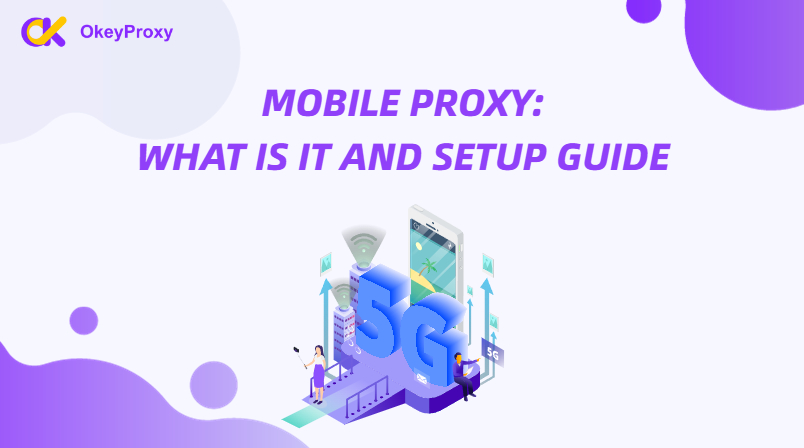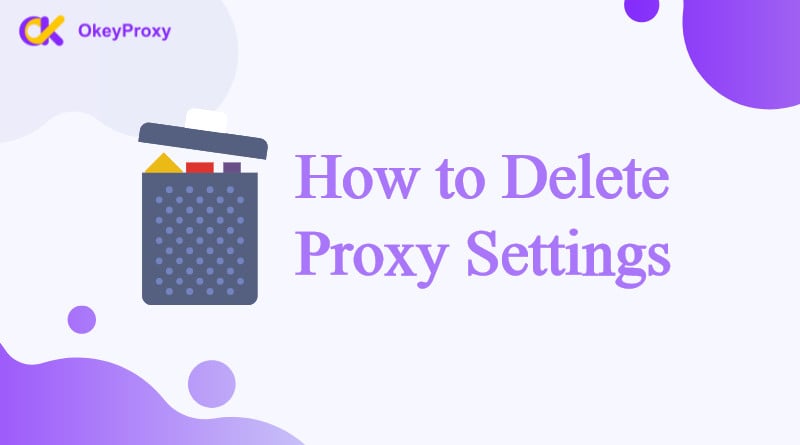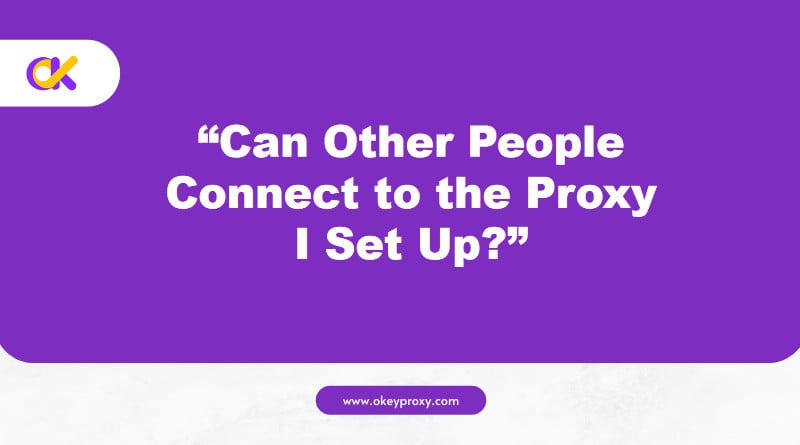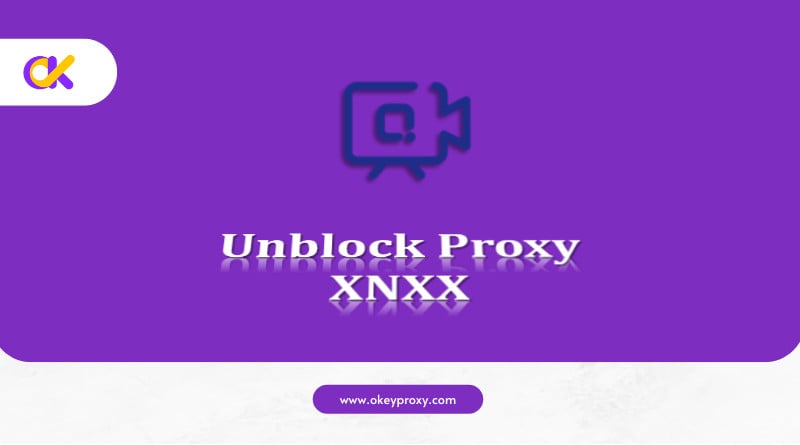Nowadays, our daily lives are intertwined with the use of the web. Network security and privacy have raised increasing concerns, with a pressing need for safeguarding both business and personal information. Therefore, the use of proxies has become a new trend. Compared to using proxies on computers, the “mobile proxies” are relatively unfamiliar to many. In this article, we will delve deeper into mobile proxies, discuss what are they, their types and applications, and how to configure the proxy settings on a mobile network.
What is a Mobile Proxy?
Firstly, let’s explain what proxies are. In general, when we connect to the internet to browse web pages, watch videos, or download data, all the requests we make are sent directly between you and the websites you visit. This direct connection means that your IP address and other potentially sensitive personal information are visible. But if you use a proxy during these online activities, it will act as a middleman, helping to forward all your requests to the target server, Similarly, it will forward the responses back to you. In this process, your actual IP address will be completely hidden because you are using the proxy server’s IP address. Therefore, you can protect your privacy to a great extent.
A mobile proxy is a proxy used on portable devices like tablets or smartphones that have internet access through mobile data. A mobile proxy routes traffic through devices connected to 3G or 4G networks. The proxy conceals your real IP address by substituting it with its IP address when connected. Mobile proxies are typically residential, making it challenging to identify masked IP addresses, enhancing privacy, security, and anonymity.
Different Types of Mobile Proxies
Mobile proxies can be categorized into various types based on different standards. Today we will introduce some of the main types that are commonly used.
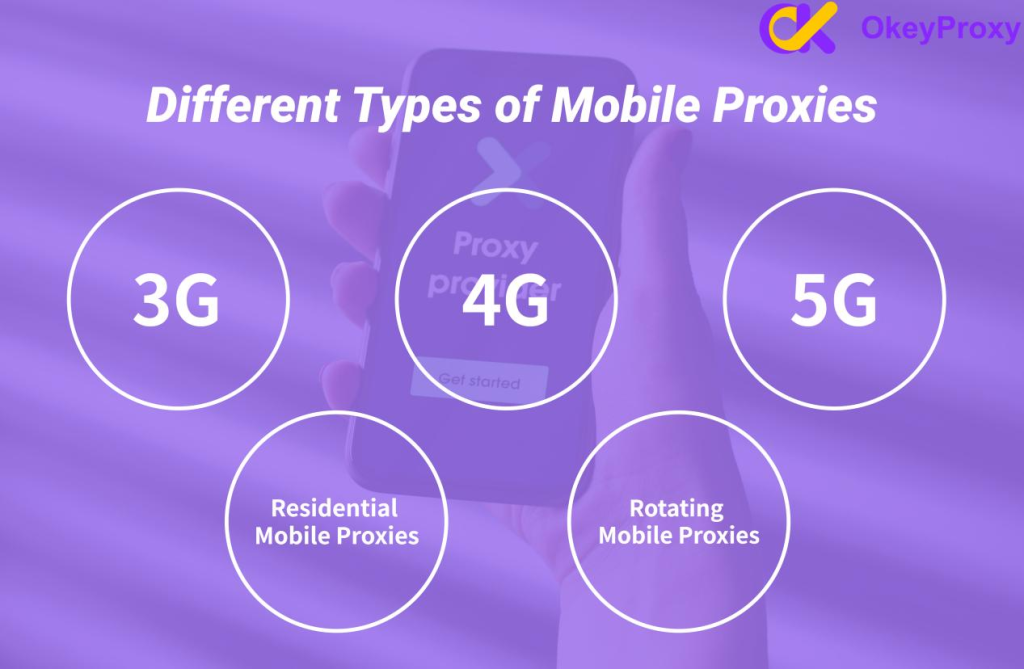
- 4G Mobile Proxies: These proxies use 4G mobile connections to route your internet traffic. They can provide faster speeds and more stable connections compared to traditional proxies, making them ideal for high-bandwidth activities.
- 5G Mobile Proxies: 5G mobile proxies are proxy servers that operate on 5G networks, the latest generation of mobile network technology. Generally, 5G networks offer faster speeds and lower latency. With 5G mobile proxies, you can experience smoother video streaming and quicker downloads. But speed also depends on the infrastructure of the mobile network and the ISP. 4G can be faster than 5G in some countries.
- Residential Mobile Proxies: A residential IP address is assigned by ISP to individual homes. Websites and online services often trust traffic coming from residential IP addresses more than other types of IP. This type of proxy is less likely to be detected or blocked.
- Rotating Mobile Proxies: “Rotating” means proxies automatically rotate IP at regular intervals. This helps to prevent blocking and improve anonymity. Using a rotating mobile proxy is beneficial for tasks that require frequent IP changes, such as web scraping and social media management.
- Shared Mobile Proxies: Shared mobile proxies are used by multiple users simultaneously. While they are cost-effective, they may pose security and privacy risks. On the contrary, dedicated proxies, while pricier, offer better security and faster speeds.
Each type of mobile phone proxy has its own advantages and use cases, it’s essential to choose the one that best suits your needs.
Applications of Mobile Proxies
Benefits for CAPTCHA Verification: A CAPTCHA is a type of test used to determine whether you are a human or a bot. There could be several reasons why you frequently encounter it on your phone: The IP address associated with your phone has a poor reputation, or in your location, websites implement stricter security measures. To reduce the frequency of encountering CAPTCHAs, you can use proxies.
Testing Websites or Apps: If you are a developer or tester, using proxies Proxies can be used to simulate different geographical locations by routing traffic through servers in different regions. This helps testers evaluate how the website or app performs regarding content delivery, language support, and regional-specific functionalities.
Social Media Management: Mobile proxies are valuable tools for managing multiple social media accounts or conducting social media marketing activities. By using proxies to assign different IP addresses to each account, you can avoid detection and prevent bans.
Accessing Location-Based Content: if you want to access some content or service, especially in some areas, proxies can help you. By masking and changing your actual IP to its proxy server’s IP, you can get the blocked content you want.
Fraud Prevention: Mobile proxy can hide your actual IP address, so your sensitive personal information is well protected. This helps you avoid exposing your privacy and prevent the risk of malicious attacks.
How To Set Up A Mobile Proxy
Here I will use the IOS system as an example to demonstrate how to set up a mobile proxy on your mobile device. The settings for Android may vary slightly depending on the manufacturer. Before setting, please note that IOS does not support SOCKS5 proxies, it works only with HTTP(S) proxies.
1. Go to the “Settings” > “WLAN” to access your Wi-Fi settings.
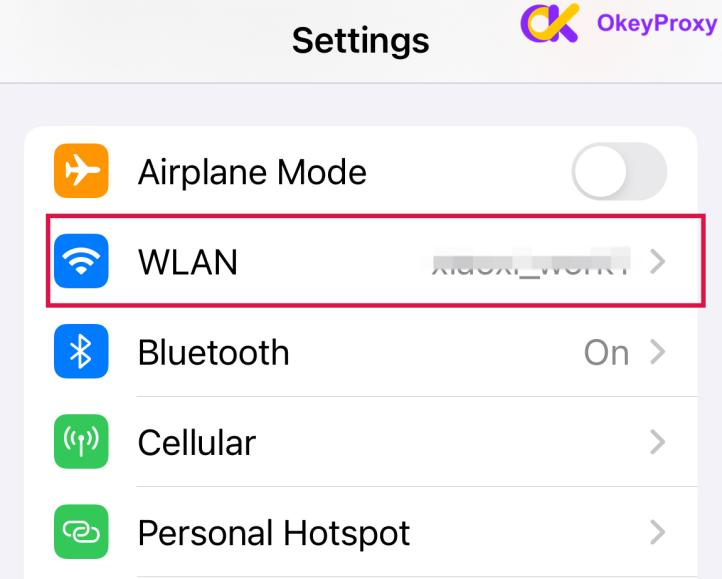
2. Tap the Wi-Fi network you are connecting. It should be the topmost option.
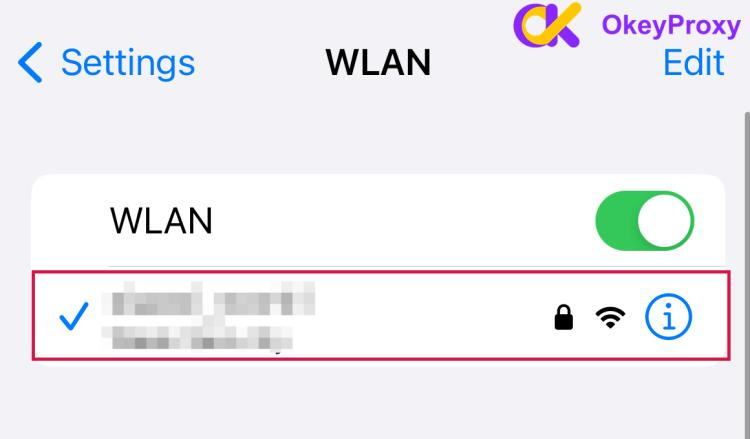
3. Scroll to the bottom, and turn on “Configure Proxy.”
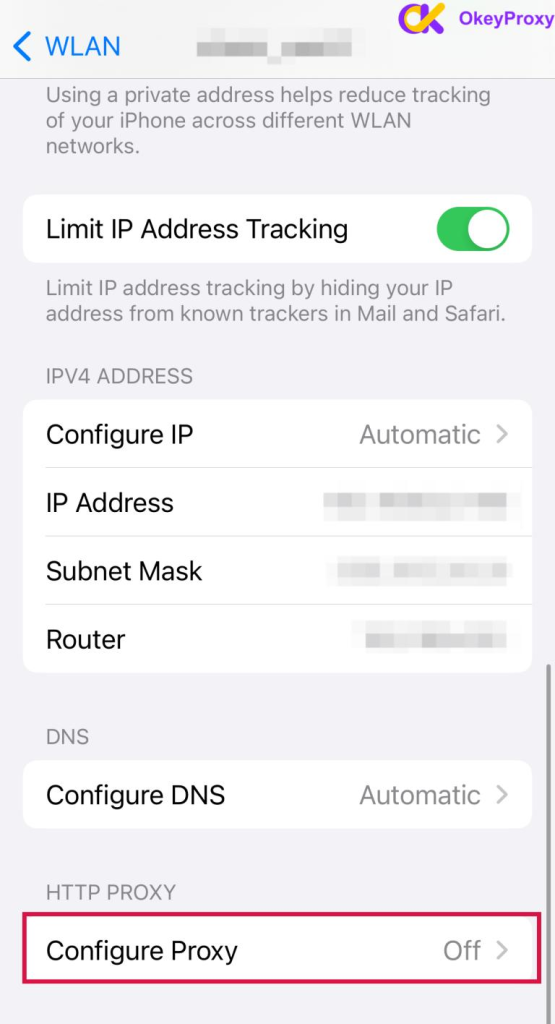
4. Select “Manual” to set up a manual mobile proxy configuration. Enter the IP address and port number from your service provider. Enable “Authentication” then enter the username and password. Tap “Save” to apply the proxy settings. If you are using the whitelisted IP, there’s no need to do this.
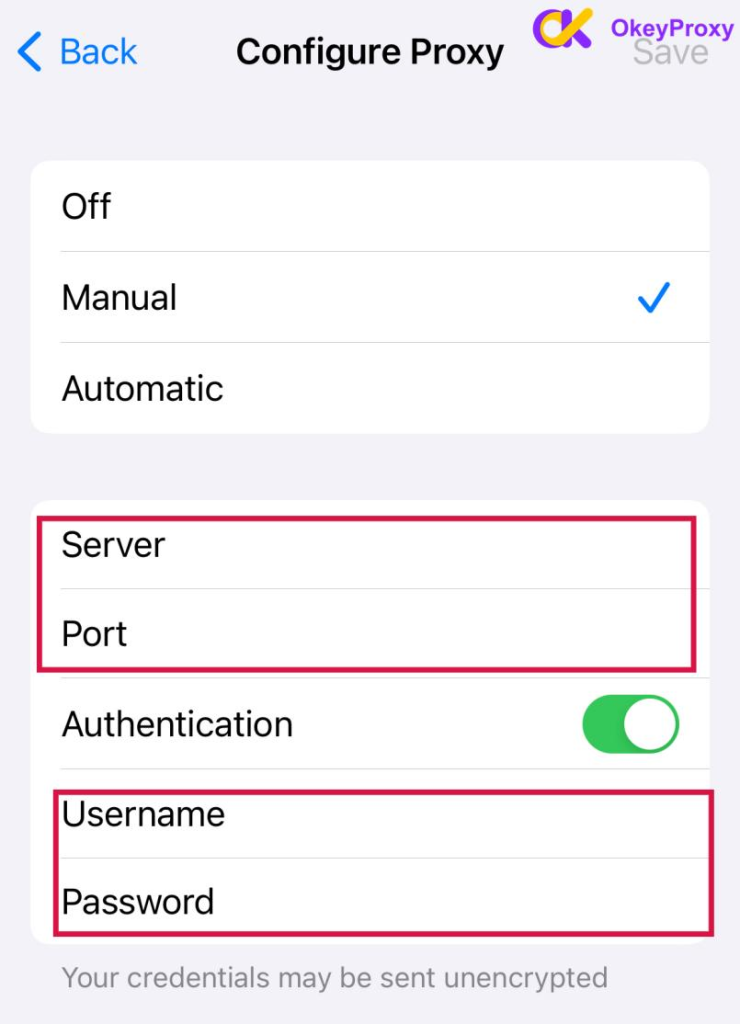
5. Open a web browser and go to ipinfo.io to verify that the proxy is set up correctly.
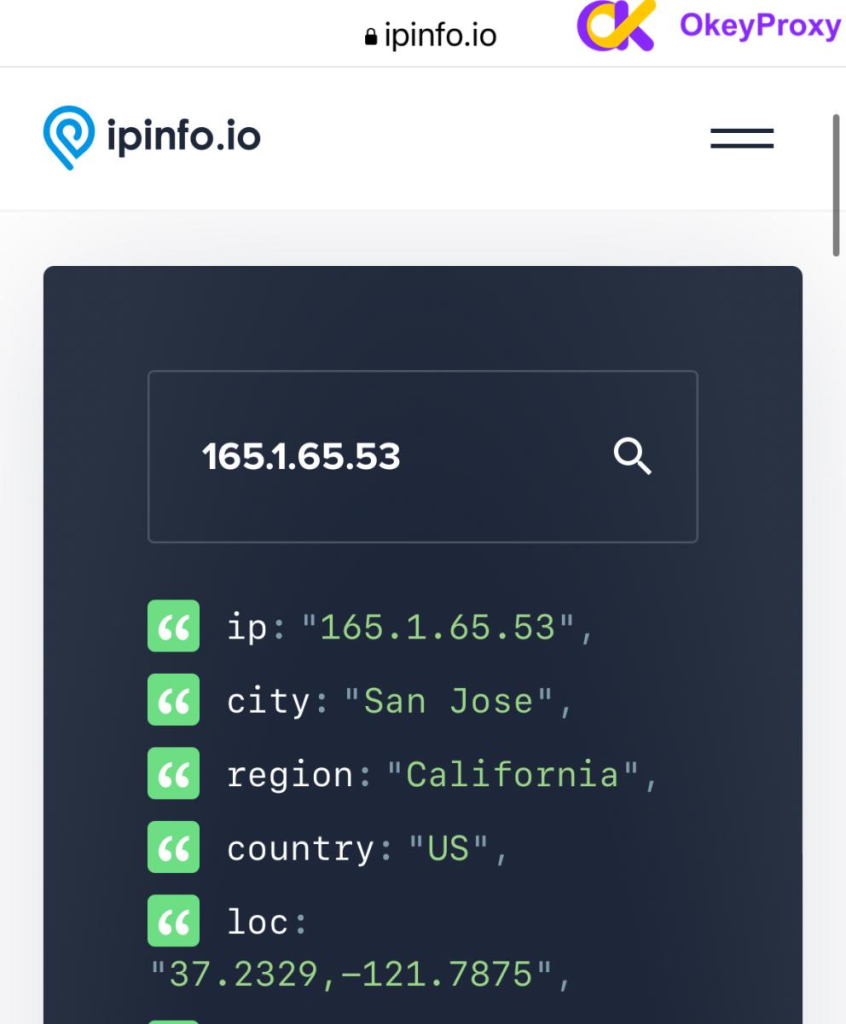
That’s it! By these steps, you’ve successfully set up the proxy on your iOS device.
After setting up the mobile proxy server on your iOS device, whether it’s an iPad or iPhone, the device will attempt to route all connection requests through the configured proxy. However, certain apps may not function properly with the proxy if they are programmed to disregard proxy settings.
Please note that this setup is specific to the Wi-Fi connection where the proxies have been configured. Once you disconnect from this Wi-Fi network or switch to a different one, the device will no longer use the proxy server for its connections.
Future Trends of Mobile Proxies
The usage of mobile proxies will witness an increasing demand driven by escalating concerns about online privacy, security, and geo-restrictions. In response, mobile proxy services are likely to integrate robust features to shield user information from cyber threats and unauthorized access. Amidst the growth, mobile proxy services may encounter regulatory hurdles. Adapting to new compliance requirements across different regions could present challenges for providers.
Furthermore, looking ahead, the integration of mobile proxies with Internet of Things (IoT) devices holds promise, offering seamless data transfer for a diverse array of smart devices. Collaborations and partnerships between proxy providers, content platforms, ISPs, and cybersecurity firms are also anticipated to burgeon, leading to the development of bundled services that cater to a broader spectrum of user needs.
Sum Up
Mobile proxies are rapidly growing in popularity, offering enhanced online privacy, security, and access to geo-restricted content. They provide faster connection speeds and improved performance for various online activities, including browsing, streaming, and gaming. Selecting a trustworthy mobile proxy service is crucial. By choosing the right mobile proxy service, you can enjoy the full benefits it offers.


